Contemporary English Homers
During the second half of the twentieth century and continuing into the twenty-first, poets, classicists, and others have produced an astounding number of distinguished English translations of the Iliad and the Odyssey. This may be surprising at first, since the study of Greek and of the Homeric texts has lost its hold on the standard school curriculum. There may be a connection, however: the decline in familiarity also sparks efforts to ensure that the stories survive and to find a contemporary idiom for them.
Prose versions aimed at general readers, notably E. V. Rieu's translation of the Odyssey (1946), which launched the series of Penguin Classics in Translation, and the Iliad (1950), were designed to be "easy reading for those who are unfamiliar with the Greek world." They were hugely successful with popular audiences although critics found them "hopelessly un-Homeric." Richmond Lattimore's translation of The Iliad (University of Chicago Press, 1951) achieved immediate critical success and enduring influence. Lattimore and his successors, including Robert Fitzgerald, Robert Fagles, Stanley Lombardo, and Edward McCrorie each offer widely different approaches to verse translation.
Contemporary creative works – more adaptation, interpretation, even appropriation, than translation – have also brought the Homeric texts to new audiences. James Joyce's Ulysses is probably the best-known, while Ezra Pound's Cantos, Derek Wolcott's Omeros, Christopher Logue's "Accounts," and Denis O'Hare and Lisa Peterson's, An Iliad, which recently concluded its second run at the Court Theatre, are just a few examples of Homer's influence on contemporary poetry, prose, and performance.
Technology has stimulated new ways to study and read Homer's works. The Perseus Project at Tufts, founded in 1985, includes both Greek and English versions of the Iliad and the Odyssey, along with commentaries. Translator Ian Johnston's Iliad and Odyssey were made available freely on the Internet, with supplemental materials such as a "List of the Deaths in the Iliad," before they were published in book form. The Center for Hellenic Studies at Harvard University publishes the Homer Multitext, a collaborative research project that presents images and texts of papyri, Byzantine manuscripts, and scholarship relating to the transmission of the Homeric texts through time.
These innovative initiatives, together with the never-ceasing reprints and new editions published each year, assure that instructors and readers have a challenging assignment in deciding which "Homer" to select.
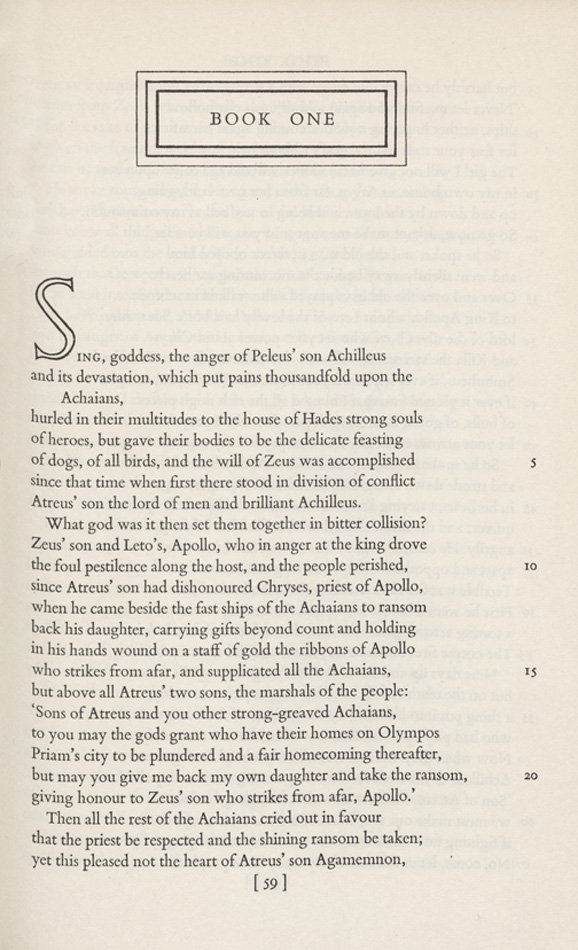
The Iliad of Homer. . . .
Chicago: University of Chicago Press, 1951.
Sing, goddess, the anger of Peleus' son Achilleus
and its devastation, which put pains thousandfold upon the Achaians,
hurled in their multitudes to the house of Hades strong souls
of heroes
Poet and classicist Richmond Lattimore worked from a Greek edition edited by D. B. Monro and Thomas W. Allen and used a "free six-beat line" for his acclaimed translation. He actively strove to capture Homer's rapidity, plainness, and directness, but emphasized that nobility was a "result," not a "quality to be directly striven for." He rendered Homer in "the plainest language of contemporary prose." (See the section in this exhibition, "Richard Lattimore's Iliad and the University of Chicago Press.")
BHL B37
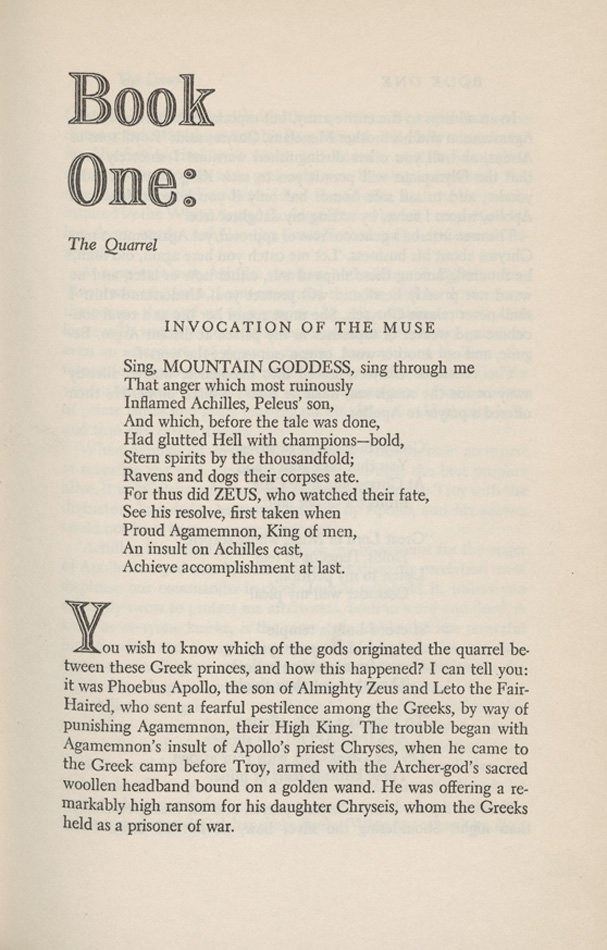
The Anger of Achilles Homer's Iliad. . . .
Garden City, NY: Doubleday & Company, 1959.
Sing, MOUNT AIN GODDESS , sing through me
That anger which most ruinously
Inflamed Achilles, Peleus' son,
And which, before the tale was done,
Had glutted Hell with champions—
Robert Graves, author of the historical nove I, Claudlius, inserted verse into his prose translation to highlight especially dramatic or important passages. Graves sought to return the "entertainment" value to Homer and bring out his satirical elements, aided by the illustrations of cartoonist Ronald Searle.
BHL B39
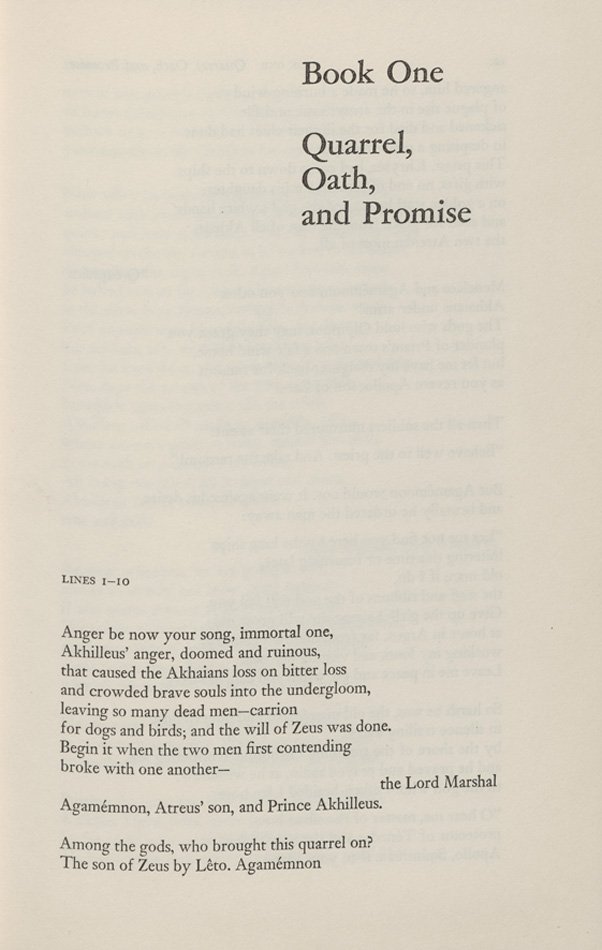
The Iliad. . . .
Garden City, NY: Anchor Press/Doubleday, 1974.
Anger be now your song, immortal one,
Akhilleus' anger, doomed and ruinous,
that caused the Akhaians loss on bitter loss
and crowded brave souls into the undergloom,
leaving so many dead men—
Lattimore's friend, Richard Fitzgerald, began serious work on his blank-verse translation of the Odyssey in 1952, the year after the publication of Lattimore's Iliad. Fitzgerald worked only from Greek texts in order to reproduce the improvisational nature of the poem and minimize Roman and neoclassical influences. His aim was to produce a "readable contemporary version of Homer." Fitzgerald's Iliad has been highly praised and widely adopted in schools.
BHL B41
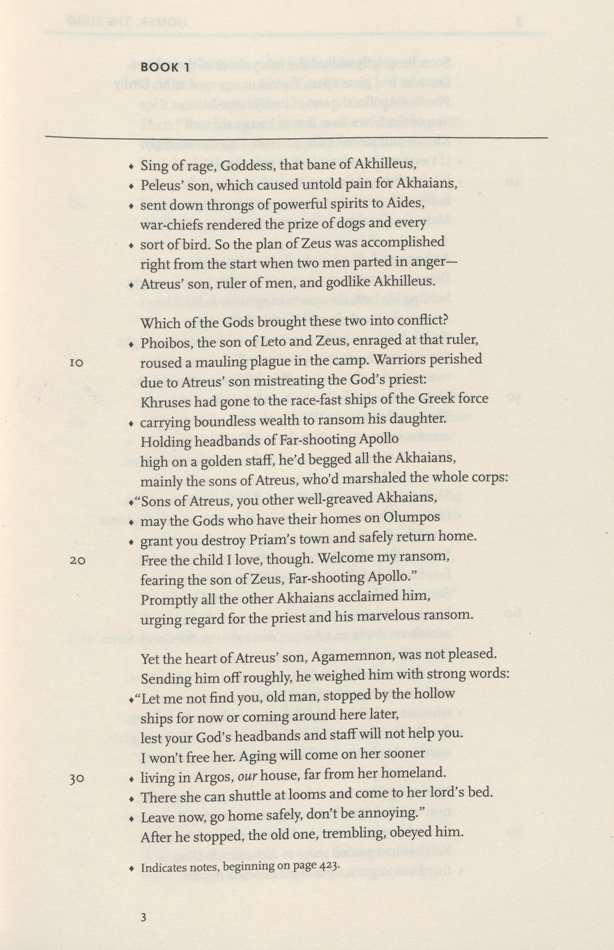
The Iliad
Baltimore: The Johns Hopkins University Press, 2012.
Sing of rage, Goddess, that bane of Akhilleus,
Peleus' son, which caused untold pain for Akhaians,
sent down throngs of powerful spirits to Aides,
war-chiefs rendered the prize of dogs and every
sort of bird.
Poet Edward McCrorie wanted to convey both the "sound" and the "sense" of the original Greek. The spelling and pronunciation of his transliterations of Greek names and the "falling rhythm" of his lines are designed to bring readers closer to Homeric meter. Several students at Trinity College, Hartford, worked with Professor Erwin Cook, who wrote the Introduction. One of them, Natalie Trevino, now a graduate student in Classics at the University of Chicago, contributed Explanatory Notes to books 13-24.
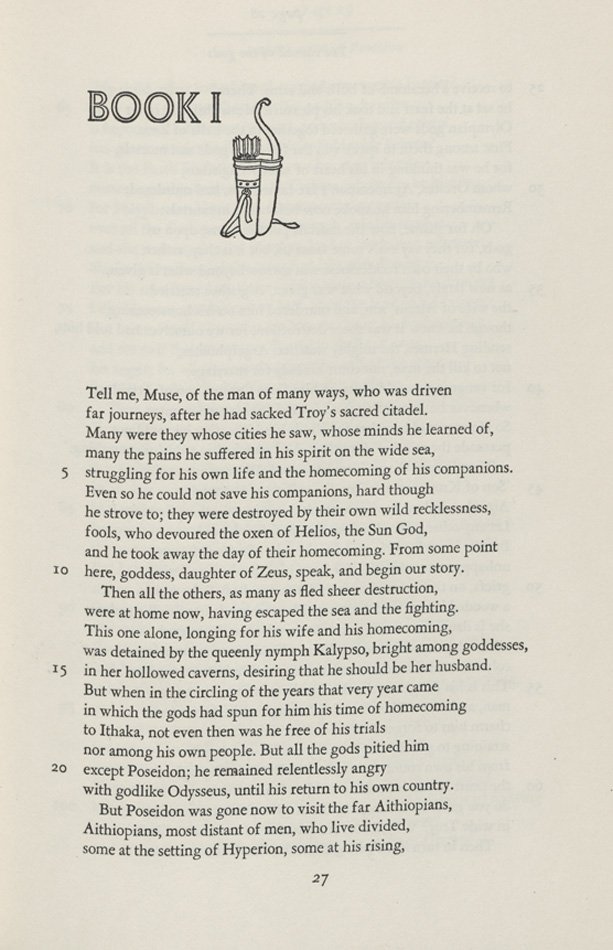
The Odyssey of Homer. . . .
New York, Evanston, and London: Harper & Row, Publishers, 1967.
Tell me, Muse, of the man of many ways, who was driven
far journeys, after he had sacked Troy's sacred citadel.
Although he was pressed to produce a version of the Odyssey immediately following the enormous success of his 1951 Iliad,Lattimore did not publish this verse translation until sixteen years later. His hesitation was due in part to the fact that his friend Robert Fitzgerald was working on his blank-verse translation of the Odyssey, which was published in 1961.
BHL B77
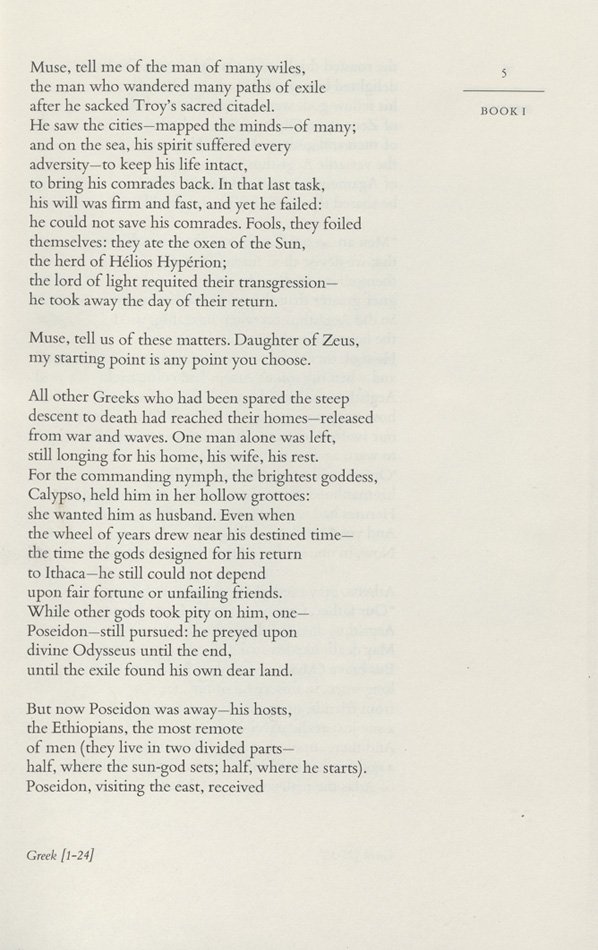
The Odyssey of Homer A New Verse Translation.. . .
Berkeley: University of California Press, 1990.
Muse, tell me of the man of many wiles,
the man who wandered many paths of exile
after he sacked Troy's sacred citadel.
Poet and professor Allen Mandelbaum used iambic pentameter to capture Homer's "musicality." He associated himself with the "Unitarians" and viewed the Odyssey as essentially the work of one author, but detected later interpolations in the Greek text, which he left out of his translation. Mandelbaum's translation received mixed reviews, but the illustrations by Italian artist Marialuisa de Romans were criticized as "gloomy and "uninformative."
BHL B80
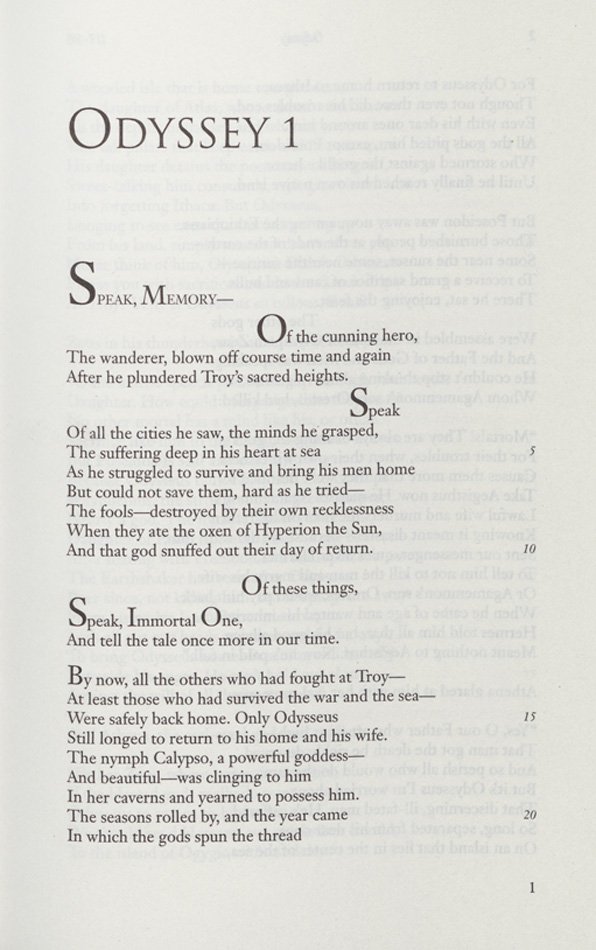
Odyssey. . . .
Indianapolis: Hackett Publishing Company, Inc., 2000.
Speak, Memory—
Of the cunning hero,
The wanderer, blown off course time and again
After he plundered Troy's sacred heights
Like his Iliad, published in 1997, Stanley Lombardo's verse translation of the Odyssey started off as scripts for dramatic performances. Lombardo described his approach as "a performance on the page for the silent reader" and identified himself as both a poet who aimed to convey Homer's "energy" and as a classicist who was concerned with representing "the contours of the Greek." He wanted to avoid a poetic diction that would "embalm Homer" and used instead a very colloquial "modern poetics based on natural language." One critic imagined classicists "blanching in horror" at Lombardo's colloquialisms but found his diction "real and for the general reader.
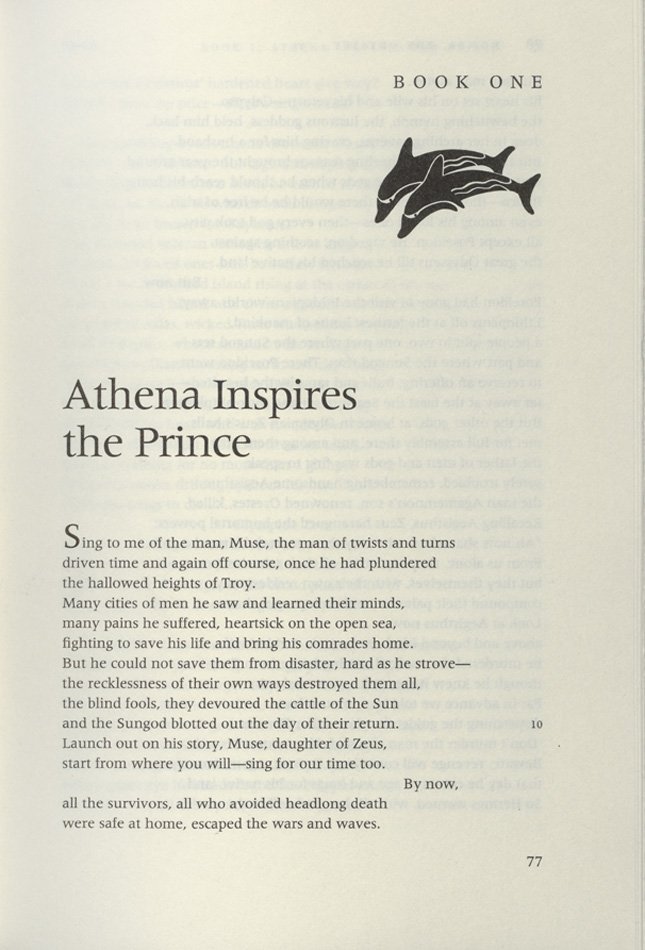
The Odyssey. . . .
New York: Viking, 1996.
Sing to me of the man, Muse, the man of twists and turns
driven time and again off course, once he had plundered
the hallowed heights of Troy.
Poet and classicist Robert Fagles published this translation of theOdyssey six years after his highly successful rendition of the Iliad. He relied on a flexible meter and freedom from literal translation, hoping to achieve a "middle ground" between the features of Homer's original text and modern readers' tastes as well as between the Greek dactylic hexameter and "a tighter, native English line." Classicist Bernard Knox, who had taught Fagles at Yale, wrote the introduction and notes. Audio versions of his Iliad(read by Derek Jacobi) and the Odyssey (read by Ian McKellan) were enormously successful.
BHL B83
